As a Project Manager, you’re the person every company needs to turn chaos into a perfectly executed plan (complete with colour-coded spreadsheets).
But before you can deliver a high-stakes, big-budget project, you’ll need to manage your biggest project yet: your CV.
This guide, complete with Project Manager CV examples, will help you craft an application that showcases your strategic thinking and ability to juggle multiple priorities without dropping the ball.
Project Manager CV
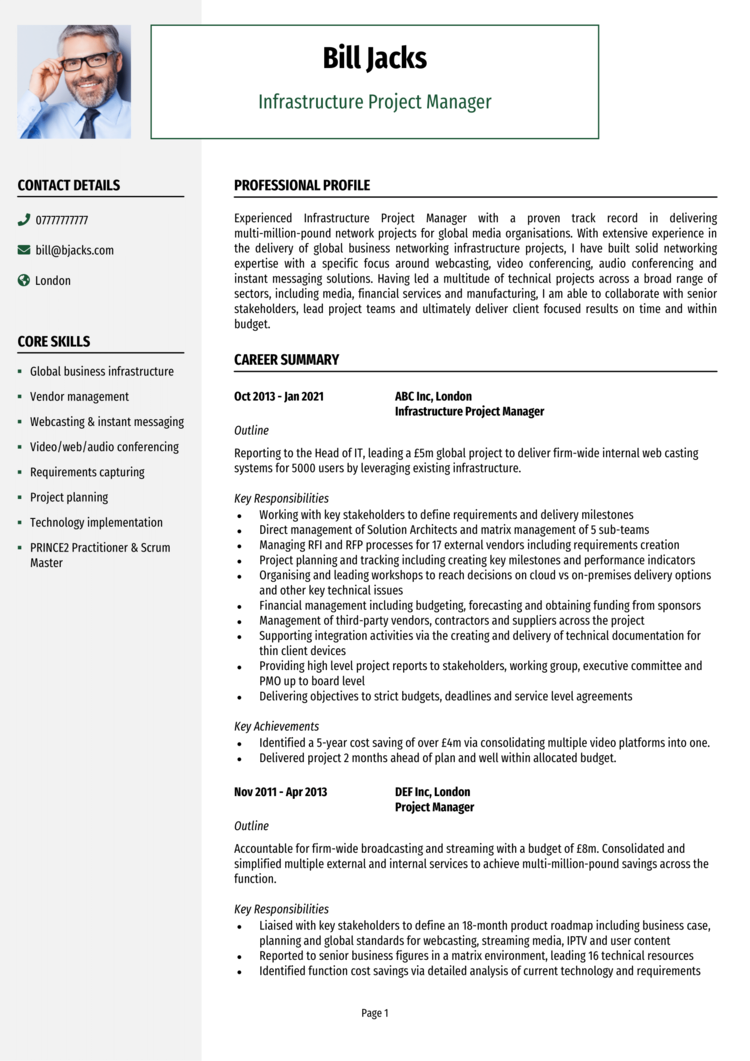
Construction Project Manager CV
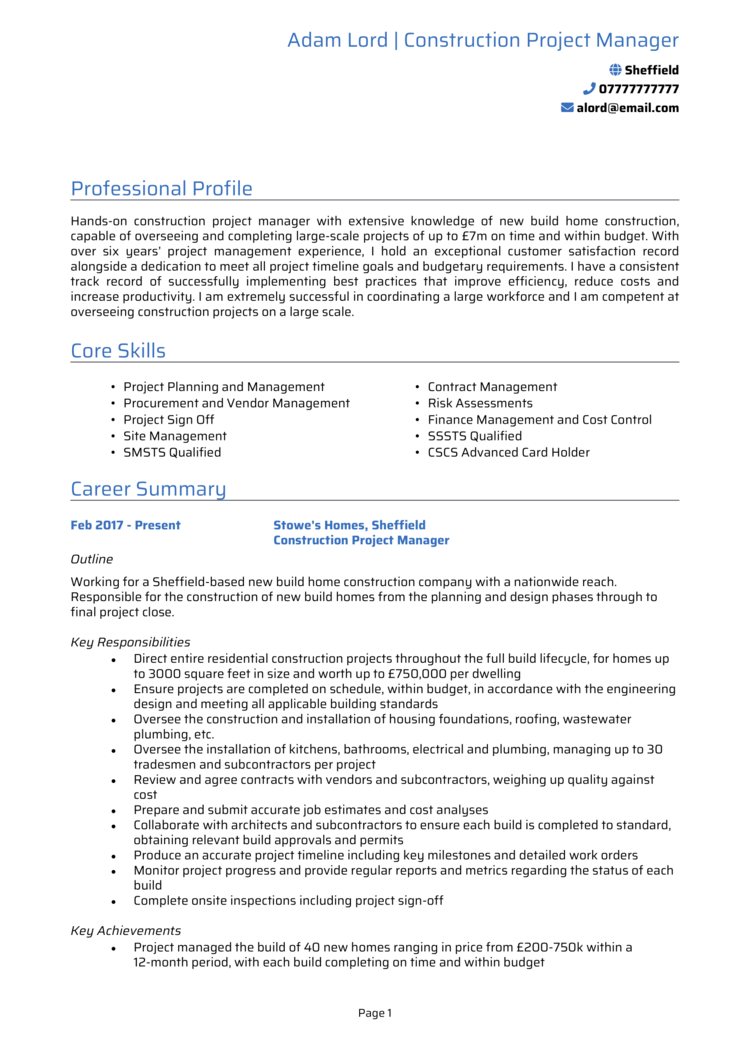
ERP Project Manager CV
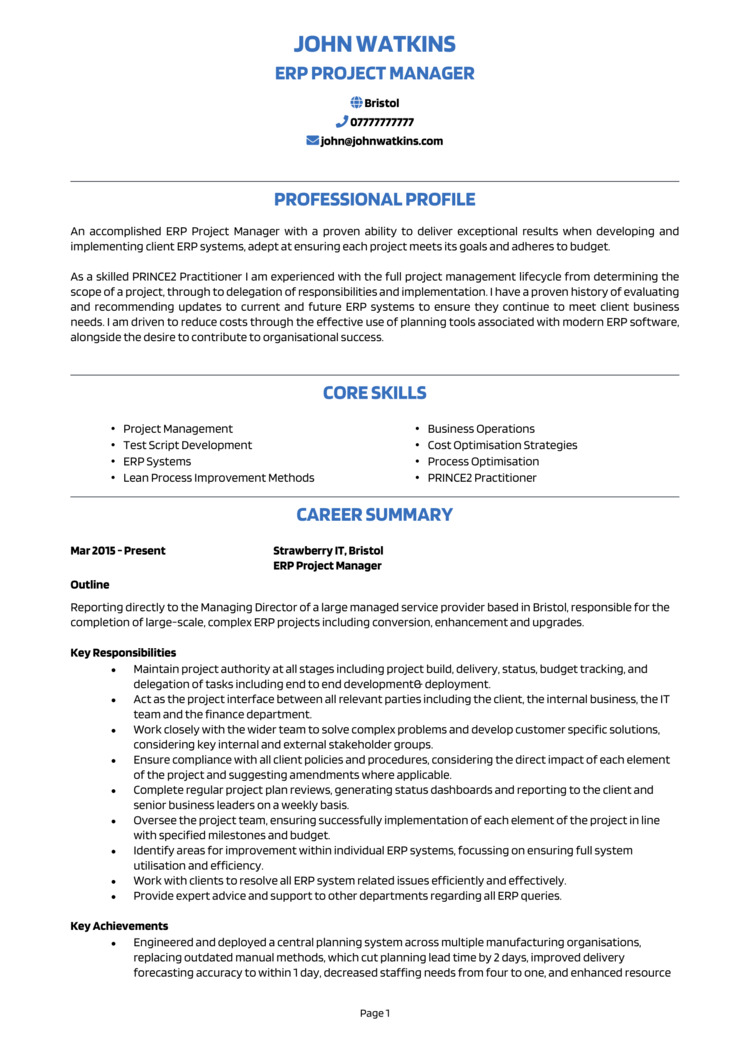
Graduate Project Manager CV
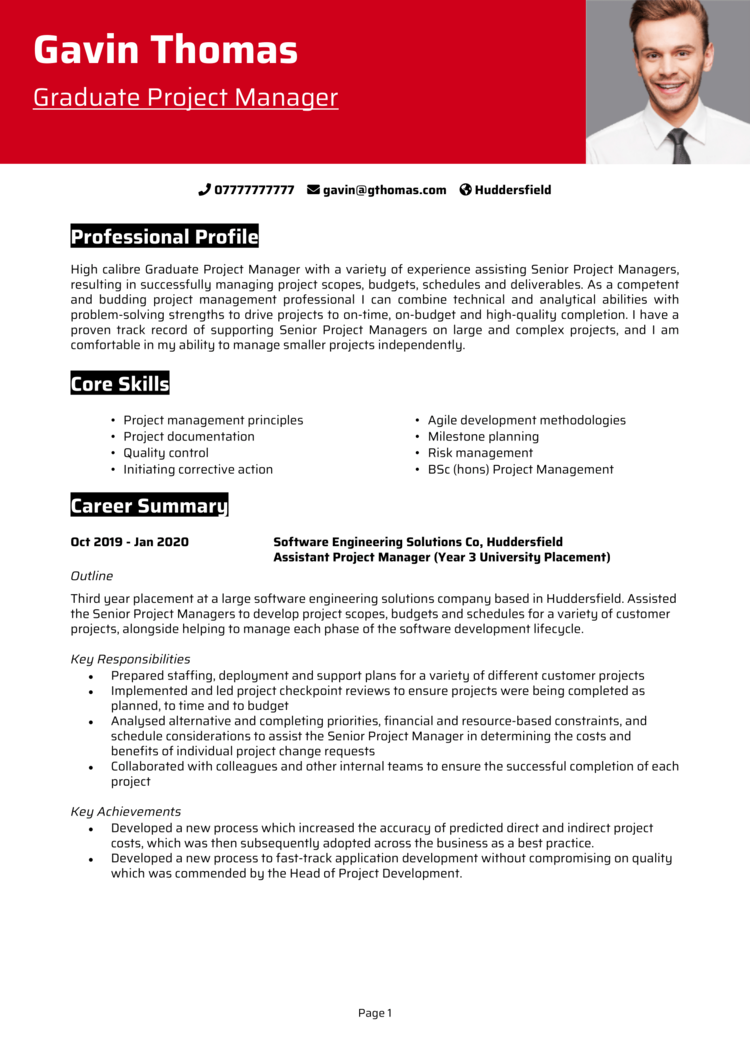
IT Project Manager CV
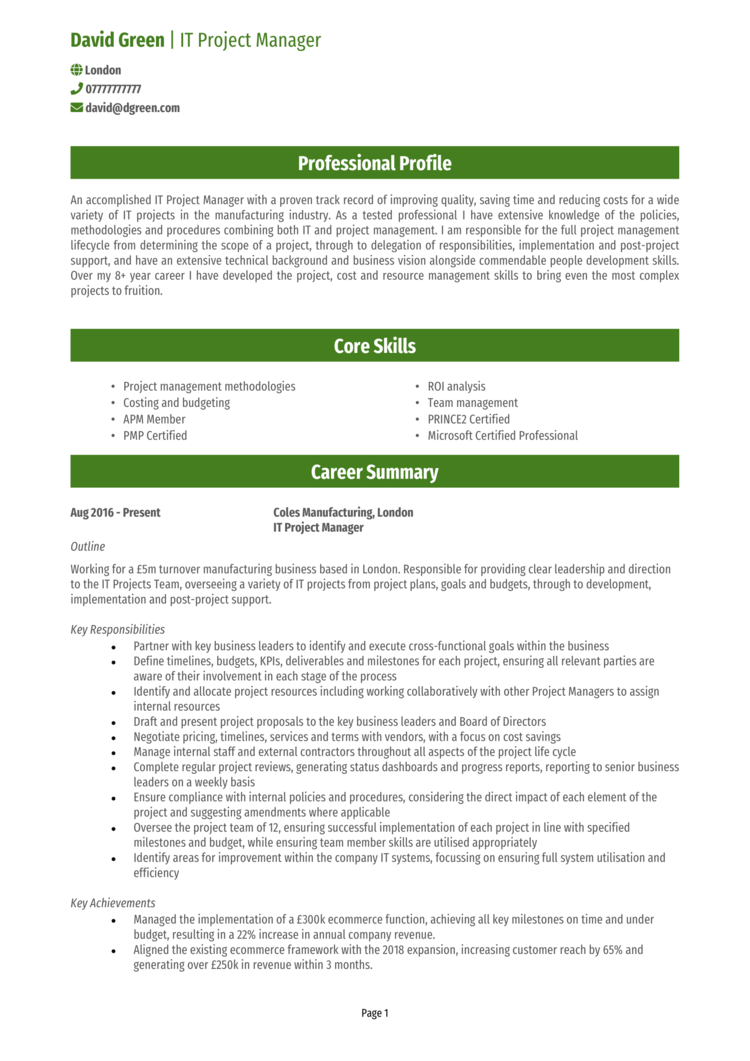
SAP Project Manager CV
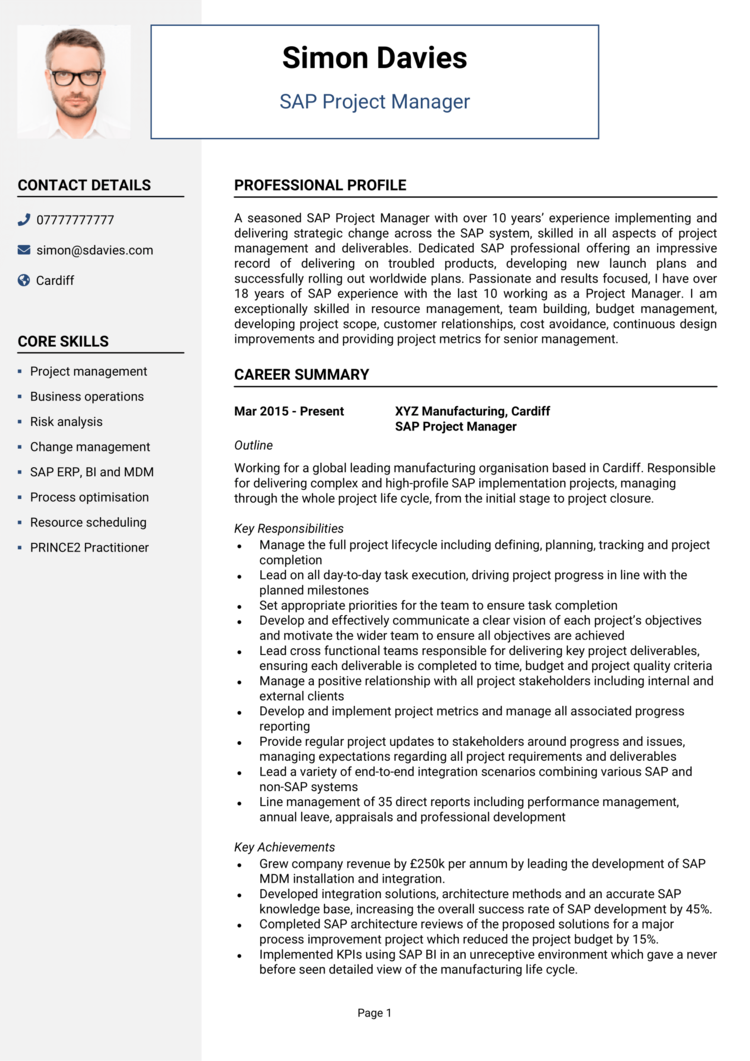
Technical Project Manager CV
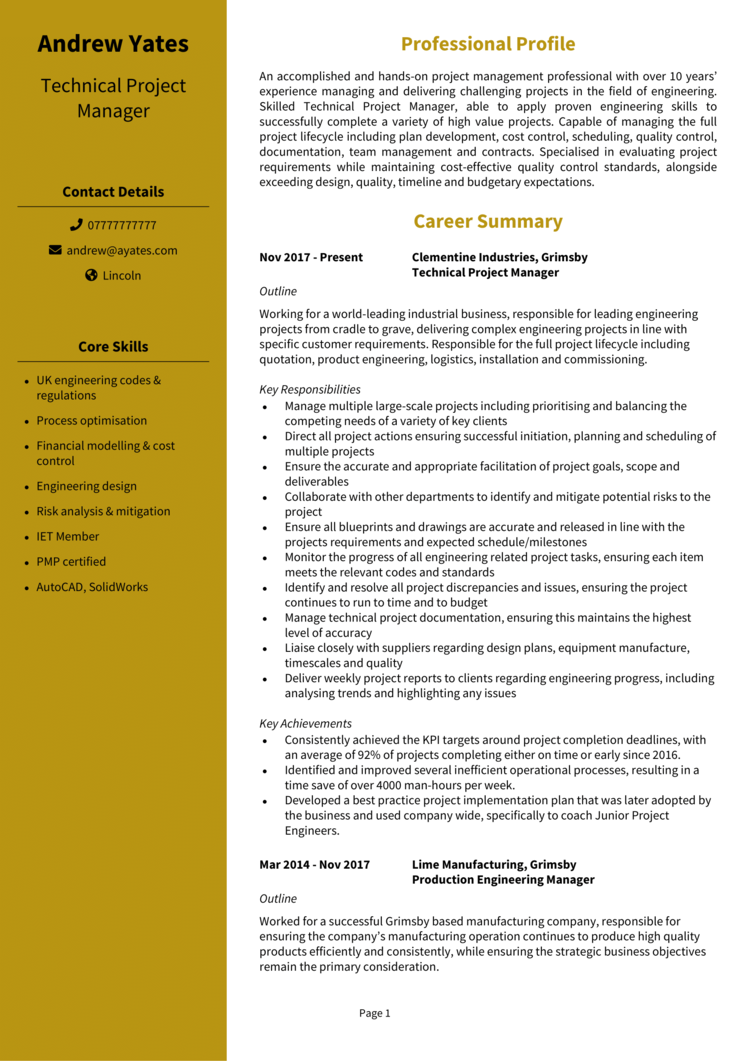
How to write your Project Manager CV
Learn how to create your own interview-winning Project Manager CV with this simple step-by-step guide.
A Project Manager CV needs to demonstrate your ability to lead teams, meet deadlines, and achieve goals – all while staying calm under pressure. Recruiters want to see your track record of delivering successful projects and the skills that make you stand out before they offer an interview.
In this guide, you’ll learn how to write a CV that highlights your project management expertise, strategic achievements, and readiness to tackle your next challenge.
The best way to structure your Project Manager CV


If your CV isn’t as organised as a well-run Gantt chart, recruiters will move onto someone who knows how to hit their milestones. Don’t make the mistake of an unnavigable layout.
Here’s how to structure your Project Manager CV:
- Name and contact details – Place your name and contact details prominently at the top of your CV for quick access. Adding a photo is up to you: it’s not a requirement for these roles.
- Profile – Use this section to summarise your experience, strengths, and what makes you the ideal candidate for a project management role.
- Core skills – Outline your primary competencies, including resource allocation and risk management, to give recruiters a snapshot of your strengths.
- Work experience – Walk through your professional experience, beginning with your latest position and moving backwards. Give more detail on the relevant and recent ones.
- Education – Outline your education and certifications, focusing on those most relevant to the role.
- Additional info – This section is optional, but it’s a good place for hobbies and interests that complement your professional profile. Focus on things that that reflect your problem-solving mindset or leadership skills.
Best format for a Project Manager CV


Your CV should reflect the professionalism and precision you bring to project management yourself. Remember, a CV isn’t just about what you’ve done; it’s about how well you present it. Even the best projects might be rejected without a slick PowerPoint deck – same goes for your CV.
Here’s how to format your Project Manager CV:
- Bullet points – Employ short, punchy bullet points to make the most important points nice and easy for the recruiter to read.
- Divide sections – Structure your CV with distinct sections that make it easy to scan.
- Use a clean font – A simple, professional font ensures readability while keeping the layout polished and tidy: it also doesn’t hurt to reflect your attention to detail.
- Keep it the right length – No more than 2 pages, which is plenty of room to list off the important details.
Writing a Project Manager CV profile


Your CV profile is your chance to give recruiters a quick snapshot of your project management skills and career achievements. Recruiters are looking through hundreds of other applications, so make sure your one stands out.
Project Manager CV profile examples
Profile 1
Experienced Project Manager with seven years of experience delivering IT infrastructure projects for large organisations, managing budgets of up to £5M. Skilled in leading cross-functional teams of 20+ members across multiple sites to implement systems that improve operational efficiency and reduce costs. Delivered projects that reduced downtime by 30 percent and improved system reliability by 25 percent.
Profile 2
Organised Project Manager with five years of experience managing HR transformation projects, specialising in streamlining processes and implementing new technologies. Successfully led a team of 10 in rolling out a global HRIS system across 15 countries, saving the organisation £500K annually. Skilled in stakeholder management and ensuring projects meet scope, schedule, and budget.
Profile 3
Proficient Project Manager with over 10 years of experience delivering large-scale construction projects, including office buildings and retail spaces worth up to £20M. Adept at coordinating contractors, managing budgets, and ensuring projects are completed on time and to specification. Delivered a multi-site project that reduced construction costs by 15% through innovative procurement strategies.
What to include in your Project Manager CV profile
Here are some tips on what to include in your Project Manager CV profile:
- Where you’ve worked – Mention industries or organisations where you’ve managed projects.
- Your top qualifications – Highlight certifications like PMP, PRINCE2, or Agile.
- Key skills – Include abilities like budgeting, interpersonal skills, and risk management.
- Types of project – Mention the type of projects you managed: whether you worked on systems implementations or digital marketing campaigns.
- Size of project – Discuss whether you’ve worked in small team initiatives or large-scale global rollouts.
- Project outcomes – Reference successful projects you’ve delivered on time and within budget.
- Stakeholders you’ve worked with – Mention clients, internal teams, or external partners.
Picking your PM niche
Your CV should focus narrowly on the roles you’re targeting.
Trying to appeal to everyone by including every skill you’ve ever used is a common mistake that makes you seem like a jack of all trades but master of none.
Instead, focus on your true specialism – the type of projects you manage, ( e.g. IT rollouts, house building, or business change) and your industry (Accounting, Pharma, Marketing)
Then add a catchy headline to your CV like:
- Banking IT infrastructure project manager
- HR project manager with extensive retail exposure
- Legal digital transformation project manager
This targeted approach helps recruiters see you as the perfect fit for their specific needs, and can be quickly tailored when applying for different jobs.
How to highlight your core skills


Your core skills section is like your project roadmap – it gives recruiters a clear view of what you bring to the role.
For Project Managers, this section should highlight leadership, strategic planning, and problem-solving skills. Tailor it to the specific role you’re applying for, whether you’re an IT specialist or a SAP Project Manager.
Trying to write a project manager CV that gets results?
Our CV builder has everything you need – expert tips, customizable templates, and pre-written content designed for project management roles. Build a winning CV in no time!
Top skills for your Project Manager CV
- Project Planning – Creating comprehensive project plans, timelines, and milestones to ensure efficient and timely delivery of project objectives.
- Risk Management – Identifying potential project risks, assessing their impact, and developing mitigation strategies to minimise disruptions.
- Budget Allocation – Managing project budgets, tracking expenditures, and ensuring cost-efficiency throughout the project lifecycle.
- Agile Methodology – Expertise in Agile frameworks such as Scrum and Kanban to deliver iterative and adaptive project solutions.
- Resource Allocation – Effectively assigning resources to tasks based on availability, skill sets, and project priorities.
- Stakeholder Coordination – Liaising with stakeholders to align expectations, address concerns, and ensure consistent communication throughout the project.
- Gantt Chart Creation – Proficiency in developing and maintaining Gantt charts for visualising project timelines and dependencies.
- Change Management – Implementing structured approaches to manage changes in project scope, timelines, or resources without disrupting overall goals.
- Project Management Tools – Advanced use of software like Microsoft Project, Asana, Jira, or Trello for tracking tasks, progress, and team collaboration.
- Performance Metrics Tracking – Measuring project performance against KPIs such as on-time delivery, budget adherence, and quality benchmarks.
Work experience


Your work experience section is where you prove you’re not just good at managing projects – you’re great at delivering results. Think of it as your portfolio of success stories. Highlight your contributions to key initiatives, the challenges you’ve overcome, and the measurable impact of your work.
Write your roles in reverse chronological order, focusing on responsibilities and achievements.
How to structure jobs

- Outline – Provide an overview of the organisation, your role, and the types of projects you managed.
- Responsibilities – Highlight tasks like planning, resource allocation, or stakeholder communication. Use action verbs like “led,” “implemented,” or “optimised.”
- Achievements – Showcase measurable results, such as meeting deadlines, reducing costs, or exceeding project goals. Include numbers where possible to add impact.
Example jobs for Project Manager
IT Project Manager | Primark
Outline
Managed IT infrastructure projects for a national retail chain, focusing on upgrading systems to improve operational efficiency and security. Delivered complex projects across 50+ locations within budget and on time.
Responsibilities
- Led a team of 15 IT professionals to implement a new ERP system, improving inventory management and financial reporting.
- Coordinated the rollout of a cloud-based CRM system to enhance customer relationship management.
- Managed a £3M budget, ensuring optimal allocation of resources and cost savings.
- Conducted risk assessments and developed mitigation strategies to ensure project success.
- Collaborated with senior stakeholders to align project outcomes with business goals.
Achievements
- Reduced system downtime by 40 percent through the implementation of a more robust IT infrastructure.
- Saved £250K annually by migrating to a cloud-based system with lower maintenance costs.
- Improved customer retention by 15 percent through enhanced CRM capabilities.
HR Project Manager | BetterLive Healthcare
Outline
Directed a global HR transformation project for a healthcare organisation, focusing on standardising processes and implementing new HR technologies across multiple regions. Managed a team of HR professionals and IT specialists to ensure successful delivery.
Responsibilities
- Implemented a cloud-based HRIS system across 12 countries, consolidating data and improving efficiency.
- Redesigned onboarding processes, reducing average new hire integration time by 20 percent.
- Managed a £1.5M budget and ensured all milestones were met within scope and timeframe.
- Provided training sessions to over 200 HR staff on the new system’s functionalities.
- Reported progress to senior executives, highlighting key achievements and challenges.
Achievements
- Achieved £500K in annual savings by automating manual HR processes.
- Improved employee satisfaction scores by 25 percent through better access to HR services.
- Reduced HR reporting errors by 30 percent with the implementation of the new system.
Construction Project Manager | Market Impact Agency
Outline
Oversaw the development of commercial and residential properties for a real estate development company. Managed multi-million-pound construction projects, ensuring delivery on time and within budget.
Responsibilities
- Coordinated contractors and suppliers to ensure timely project execution across three construction sites.
- Developed detailed project plans and schedules, minimising delays and disruptions.
- Managed a £10M budget, tracking expenses and identifying cost-saving opportunities.
- Conducted regular site inspections to ensure compliance with safety and quality standards.
- Liaised with clients and stakeholders to provide updates and incorporate feedback.
Achievements
- Delivered a £15M office complex three months ahead of schedule, saving £500K in costs.
- Reduced procurement costs by 12 percent through strategic supplier negotiations.
- Increased project efficiency by 20 percent through the adoption of lean construction practices.
Education section


The education section is crucial for Project Managers, as it demonstrates your foundational knowledge and professional development. Include degrees, certifications, and any relevant courses.
List your qualifications in reverse chronological order, starting with the most recent.
Qualifications recruiters look for in a Project Manager
- Project Management Professional (PMP) – Globally recognised certification in project management.
- PRINCE2 Practitioner – Expertise in managing projects using structured methodologies.
- Certified ScrumMaster (CSM) – Training in Agile and Scrum principles.
- Bachelor’s Degree in Business Administration – Foundational knowledge of business and management.
- Lean Six Sigma Green Belt Certification – Expertise in improving efficiency and reducing waste in processes.





